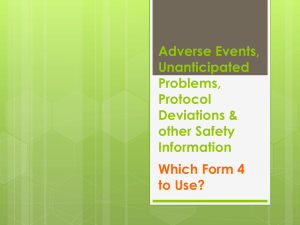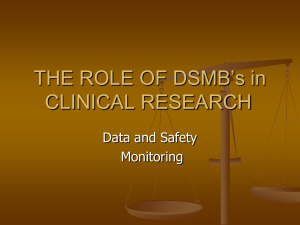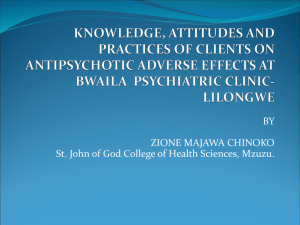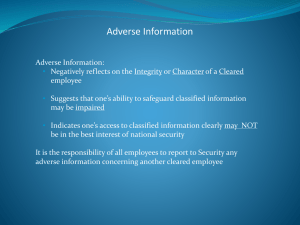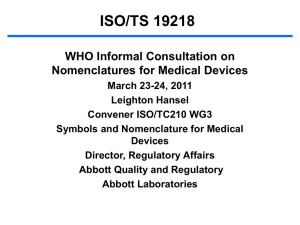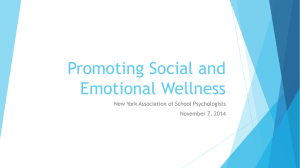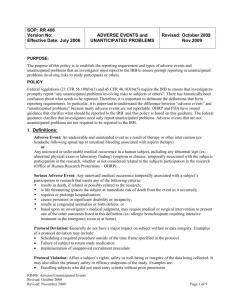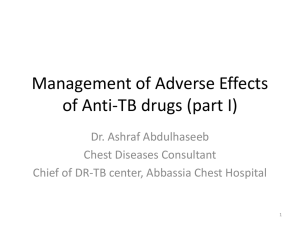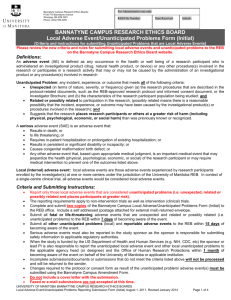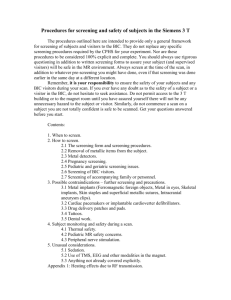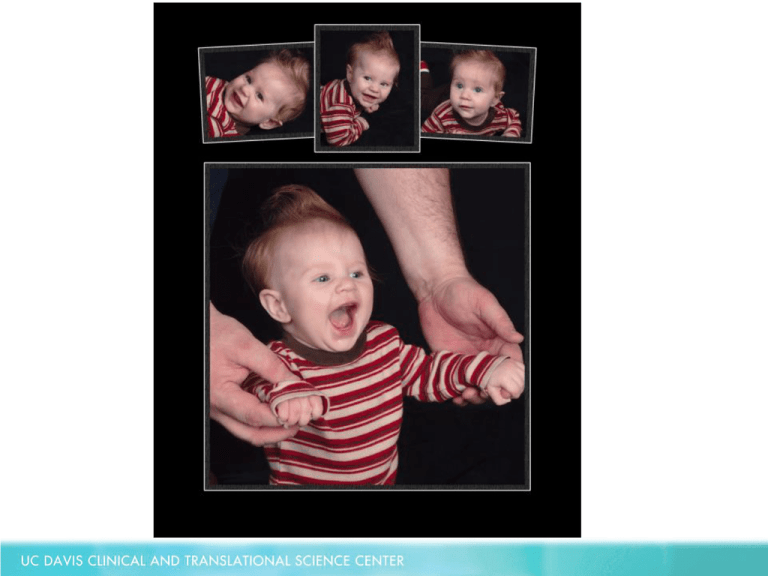
Did that just happen?
What do I do now?
And
Identifying and Reporting
Adverse Events and Protocol
Deviations
Elizabeth Mathis, CCRP
18 February 2014
Overview and Objectives
Adverse Events
Serious Adverse Events
Protocol Deviations
Recognize
Review
http://www.hhs.gov/ohrp/policy/advevntguid.html
Report
Unanticipated Problem
Definition
Incident, Experience, or Outcome
Unexpected
Nature
Possibly related
to participation in
Research
Places subjects or
others at greater
risk of harm
Physical
Psychological
Frequency
Economic
Severity
Social
http://www.hhs.gov/ohrp/policy/advevntguid.html
Unanticipated Problem or Not?
Behavioral Study
Collects identifiable
info
Illicit drug use and
illegal behaviors of
college students
Data stored on
unencrypted laptop
Laptop stolen from car
Checklist:
Incident, experience,
or outcome?
⃝
⃝
Unexpected?
⃝
Related to
participation?
⃝
Greater risk of harm?
Unanticipated Problem or Not?
Device Intervention
Study
Vascular stent placement vs
surgery for severe carotid
artery stenosis
Patient assigned to stent
placement study group
After procedure, the patient
suffers a severe stroke
resulting in left-sided paralysis
Protocol and ICF indicated a 510% chance of stroke for both
study groups. The DSMB
concludes the occurrence of
stroke was expected as well as
frequency.
Checklist:
Incident, experience,
or outcome?
⃝
⃝
Unexpected?
⃝
Related to
participation?
⃝
Greater risk of harm?
Unanticipated Problem or Not?
Drug Intervention Study Checklist:
For essential hypertension
testing new anti-hypertensive
drug.
Three of the first ten subjects
have severe GERD symptoms
that began within one week of
starting the investigational drug
and resolve after drug
discontinued.
At beginning of trial, no
documented evidence of GERD
in protocol and ICF do not
describe GERD as risk.
Investigator determines that
GERD symptoms were caused
by the study drug and warrant
modification of the ICF to
include GERD as a risk of the
research.
Incident, experience,
or outcome?
⃝
⃝
Unexpected?
⃝
Related to
participation?
⃝
Greater risk of harm?
Adverse Events
Definition
Abnormal Signs
Physical Exam
Lab Results
Temporally Associated
Symptom
Disease
Related or Not
Unintended or Unfavorable
http://www.hhs.gov/ohrp/policy/advevntguid.html
Unanticipated Problem
vs.
Adverse Events
Adverse Events
A=
Adverse Events that are not Unanticipated Problems
B=
C=
Adverse Events Unanticipated
problems that
that are
are not
Unanticipated
Adverse Events
Problems
http://www.hhs.gov/ohrp/policy/advevntguid.html
Unanticipated problems
AE or Not?
Subject # 1
On quadruple therapy study for Hepatitis C
ICF states:
Decreases in laboratory tests measuring
white blood cells, platelets, red blood cells.
AE or Not?
Subject # 1
AE or Not?
Subject # 2
On triple therapy study for Hepatitis C
Package insert states:
AE or Not?
Subject # 2
Progress note for Follow up week 24 visit:
AE or Not?
Subject # 3
Device study to detect mucosal oxygenation
during AAA repair
From ICF:
Physical Risks:
Rare
Pain or discomfort upon insertion of the rectal sensor due to an anal fissure (tear),
Abscess, Fistula or inflamed hemorrhoid.
Rectal perforation (puncture).
AE or Not?
Subject # 4
On triple therapy study for Hepatitis C
http://sv-galena.com/Trip6/201012Bahamas/Part01.html
Serious Adverse Events
Definition
Any adverse event that:
Results in
death
Is lifethreatening
Results in
hospitalization
Results in birth
defect
Results in
disability
Results in
intervention to
prevent one of
these
http://www.fda.gov/safety/medwatch/howtoreport/ucm053087.htm
SAE or Not?
Subject # 5
On quadruple therapy study for Hepatitis C
SAE or Not?
Subject #6
(1) Subject #389204 had Week 8 laboratory tests collected on February 18,
2008, and the corresponding laboratory report that was faxed to your site on
February 20, 2008, showed that the subject’s creatinine (CR) level measured
3.2 mg/dL.*
* Normal range is 0.5 -1.2 mg/dL.
http://www.fda.gov/ICECI/EnforcementActions/WarningLetters/2011/ucm244336.htm
Serious Adverse Events
Important Distinction
Severe
Serious
Protocol Deviations
Recognize
Review
Report
Protocol Deviations
Definition
IRB
Approved
Protocol
Actual
Research
Activities
Performed
Protocol Deviations
Definition
Harmed subjects or
others
Indicates subjects or
others might be at
increased risk of
harm
Significantly affects
conduct of clinical
trial
Non-compliance
with federal
regulations or
requirements of IRB
Failure to follow
protocol through
action or inaction
Change to protocol
to eliminate
immediate hazard
http://research/f/f#Forms-IRBAdmin
Deviation or Not?
Subject # 7
On treatment for PBC-related liver enzyme
elevation
Exclusion Criteria #4:
Prohibited 6 months prior to Day 0 and throughout the trial (i.e., to last dose
to last dose and/or EOT): azathioprine, colchicine, cyclosporine,
methotrexate, mycophenolate mofetil, pentoxifylline; fenofibrate or
other fibrates; budesonide and other systemic corticosteroids;
Deviation or Not?
Subject # 8
On triple therapy for
Hep-C
Deviation or Not?
Subject # [Redacted]
• Records of each subject's case history are not all accurate and complete.
Specifically, individual subject case history files including source
documentation and CRFs contain missing or discrepant information,
including, but not limited to the following:
•for subject [redacted] missing documentation of required physical
examinations, incomplete or missing documentation regarding the
placement of [redacted] and Complications Report or Intercurrent Event
Report not completed;
•missing information regarding surgical complications, the number of
devices implanted, and device accountability for subject [redacted] and,
•source worksheets and CRFs do not record any information or
measurements regarding required evaluations for subjects [redacted]
http://www.fda.gov/ICECI/EnforcementActions/WarningLetter
Overview and Objectives
Adverse Events,
Serious Adverse Events,
and Protocol Deviations
Recognize
Review
Report
AE Review
AE Review
SAE Review
Deviation Review
http://www.nia.nih.gov/sites/default/files/protocoldeviationscore
formfillable.pdf
Overview
and Objectives
Adverse Event,
Serious Adverse Event,
and Protocol Deviations
Recognize
Review
Report
Adverse Events
Reporting to IRB
http://research/f/f#Forms-IRBAdmin
Internal Serious Adverse Events
Reporting to Sponsor
CTSC Research Guidebook, pg 79
Internal Serious Adverse Events
Reporting to IRB
http://research/f/f#Forms-IRBAdmin
Internal Serious Adverse
Events
Reporting to IRB
http://research/f/f#Forms-IRBAdmin
External Serious Adverse Events
External Serious Adverse
Events
Reporting to IRB
External Serious Adverse
Events
Reporting to IRB
Protocol Deviations
Reporting to Sponsor
Protocol Deviations
Reporting to IRB
http://research/f/f#Forms-IRBAdmin
Protocol Deviations
Reporting to IRB
http://research/f/f#Forms-IRBAdmin
Recap
Adverse Events
Serious Adverse Events
Protocol Deviations
Recognize
Review
Report
Resources
1. IRB Forms http://research/f/f#Forms-IRBAdmin
2. OHRP guidance:
http://www.hhs.gov/ohrp/policy/advevntguid.ht
ml
3. FDA Warning Letter
http://www.fda.gov/ICECI/EnforcementActions/
WarningLetters/2011/ucm244336.htm
4. SACHRP recommendations on Protocol Deviations:
http://www.hhs.gov/ohrp/sachrp/mtgings/2012
%20Feb%20Mtg/protocoldeviations.pdf
5. IRB SOPs: http://research.ucdavis.edu/gt/irb-sop

